
Best Vehicles for Emergency Preparedness: What You Should Know
Share
When disaster strikes, having the right vehicle can make a huge difference in your ability to evacuate safely, transport supplies, and navigate rough conditions. Whether you're preparing for natural disasters, civil unrest, or off-grid survival, the best emergency preparedness vehicles should be reliable, fuel-efficient, and capable of handling various terrains. Here’s what you should consider when choosing a vehicle for emergency preparedness.
1. What Makes a Good Emergency Vehicle?
Before choosing a specific make and model, look for these key features:
- Reliability: A vehicle that won’t break down when you need it most.
- Fuel Efficiency: Gas may be scarce in an emergency, so a vehicle with good MPG or alternative fuel options is ideal.
- Cargo Space: Enough room to store emergency supplies, food, water, and tools.
- Off-Road Capability: The ability to handle rough terrain, especially if roads are damaged.
- Durability: A vehicle with minimal electronics (less reliance on computers) is better suited for EMP resistance and long-term reliability.
- Towing Capacity: If you need to haul a trailer, camper, or additional gear.
2. Best Vehicle Types for Emergency Preparedness
4x4 Trucks (Ford F-150, Toyota Tacoma, Chevrolet Silverado)
Why It’s Great:
-
- High ground clearance for rough terrain.
- Large towing capacity for trailers, boats, or extra gear.
- Plenty of cargo space for emergency supplies.
Best For: People who need a rugged vehicle for off-road or rural evacuations.
SUVs (Toyota 4Runner, Jeep Wrangler, Ford Bronco)
Why It’s Great:
-
- Excellent off-road performance.
- Decent fuel efficiency compared to trucks.
- Can double as temporary shelter if needed.
Best For: Families needing a mix of comfort and off-road capability.
Diesel-Powered Vehicles (Chevrolet Silverado 2500HD, Ford F-250, Mercedes Sprinter Diesel)
Why It’s Great:
-
- Diesel fuel lasts longer in storage than gasoline.
- More torque for towing heavy loads.
- Often more fuel-efficient for long distances.
Best For: Those who prioritize fuel longevity and towing ability.
Hybrid & Fuel-Efficient Vehicles (Toyota Prius AWD, Ford Maverick Hybrid)
Why It’s Great:
-
- Excellent fuel economy, reducing dependency on gas stations.
- Can act as a power source for small electronics.
- AWD options allow moderate off-road travel.
Best For: Urban preppers looking to conserve fuel during an evacuation.
Motorcycles & Bicycles (Honda CRF300L, Yamaha Tenere 700, E-Bikes)
Why It’s Great:
-
- Can weave through traffic and bypass roadblocks.
- Require little fuel or, in the case of bicycles, none at all.
- Can be transported in larger vehicles for backup.
Best For: Solo travelers needing a backup or secondary vehicle.
Vans & RVs (Mercedes Sprinter 4x4, Ford Transit AWD, Custom Camper Vans)
Why It’s Great:
-
- Can be converted into a mobile survival shelter.
- Large storage capacity for supplies.
- Good for long-term off-grid living.
Best For: Those looking for a mobile home base during an emergency.
3. Essential Modifications for Emergency Vehicles
Even if you have a great vehicle, adding these upgrades will improve your preparedness:
- Roof Rack or Cargo Carrier – Extra storage for fuel, water, and gear.
- Winch & Tow Straps – Help pull yourself or others out of tough spots.
- All-Terrain Tires – Better traction on mud, snow, or debris.
- Auxiliary Fuel Tanks – Increase driving range without frequent stops.
- Solar Chargers & Inverters – Keep small electronics powered.
- CB or HAM Radio – Reliable communication when cell networks fail.
- First Aid & Emergency Kit – Essential supplies for injuries and survival.
4. Gas vs. Diesel vs. Electric: Which Is Best?
Best Choice: Diesel for long-term storage, but hybrids for fuel efficiency during short-term disasters.
5. Final Tips for Choosing Your Emergency Vehicle
- Test your vehicle in different conditions – Drive it off-road, in heavy traffic, and at night to know how it performs.
- Keep it well-maintained – A dead battery or low tires can ruin an evacuation plan.
- Store extra fuel safely – Keep fuel in approved containers in case gas stations run dry.
- Have a backup plan – If your vehicle breaks down, know alternative routes and backup transportation options.
Conclusion
The best emergency vehicle depends on your needs, location, and budget. A rugged 4x4 truck or SUV is ideal for off-road and rural survival, while a fuel-efficient hybrid may be best for urban preppers. No matter what you choose, proper maintenance and preparedness will ensure you're ready to go when disaster strikes.
To learn how to prep your vehicle for an emergency check out this article.
Other Articles of Interest
Understanding an EMP and How to Protect Against It
Fuel Storage for Emergencies: What You Need to Know
How to Financially Prepare for Emergencies Without Going Broke
